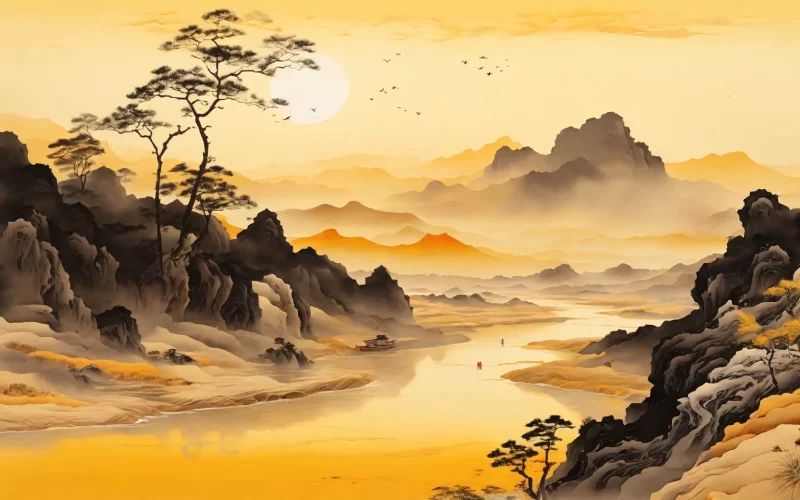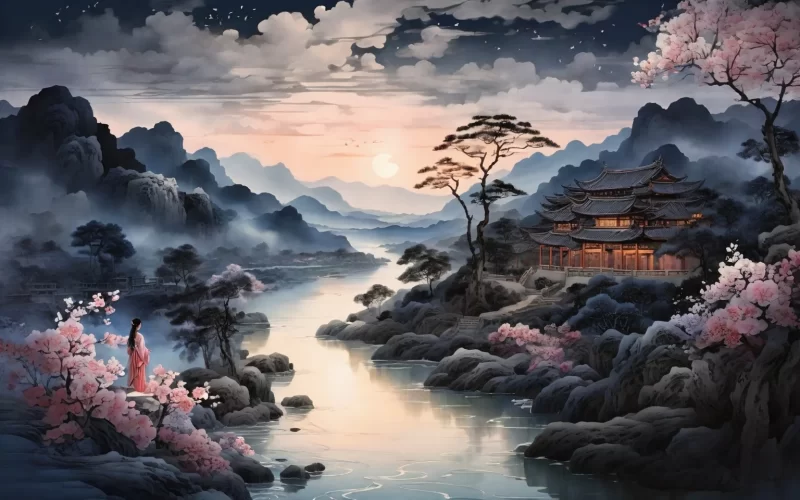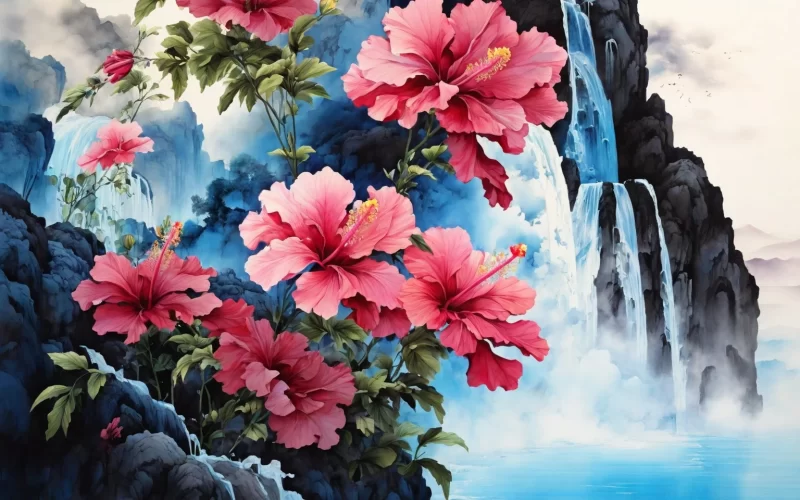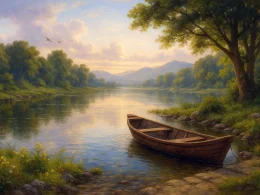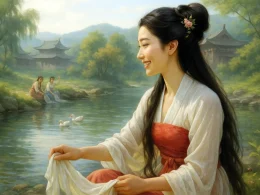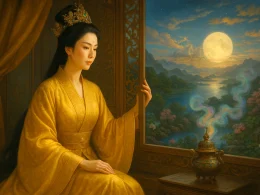A single carriage goes to the frontier;
An envoy crosses northwest mountains high.
Like tumbleweed I leave the fortress drear;
As wild geese I come under Tartarian sky.
In boundless desert lonely smokes rise straight;
Over endless river the sun sinks round.
I meet a cavalier at the camp gate;
In northern fort the general will be found.
Original Poem
「使至塞上」
王维
单车欲问边,属国过居延。
征蓬出汉塞,归雁入胡天。
大漠孤烟直,长河落日圆。
萧关逢侯骑,都护在燕然。
Interpretation
Composed in 737 AD when Wang Wei was dispatched to inspect frontier defenses, this travelogue-style poem captures both the majestic landscapes of the northwest borderlands and the poet's emotional journey.
First Couplet: "单车欲问边,属国过居延。"
Dān chē yù wèn biān, shǔ guó guò Jūyán.
A light carriage carries me to frontier gates, passing Juyan's distant western states.
These opening lines establish the mission's purpose and route with geographical precision. The modest retinue ("light carriage") reflects both the terrain's desolation and the poet's subdued mood, subtly conveying his sense of isolation.
Second Couplet: "征蓬出汉塞,归雁入胡天。"
Zhēng péng chū Hàn sài, guī yàn rù Hú tiān.
Like tumbleweed leaving Han's palisade, as homing geese enter Tartar sky.
Natural metaphors articulate complex emotions. The rootless tumbleweed embodies the poet's displacement, while northbound migratory geese accentuate his homesickness. This couplet's imagery transforms landscape observation into emotional allegory.
Third Couplet: "大漠孤烟直,长河落日圆。"
Dà mò gū yān zhí, cháng hé luòrì yuán.
Lone smoke rises straight in endless sands; the long river cradles sunset's perfect sphere.
These iconic lines depict the frontier's sublime grandeur. The vertical smoke plume against horizontal wasteland creates striking spatial tension, while the geometrically "perfect" sunset over the winding river achieves yin-yang balance. The imagery suggests both military vigilance (smoke signals) and cosmic harmony.
Fourth Couplet: "萧关逢侯骑,都护在燕然。"
Xiāo guān féng hóu qí, Dūhù zài Yānrán.
At Xiaoguan outpost, scouts report the commander still campaigns at Yanran's fort.
The closing encounter with cavalry scouts grounds the poem in military reality. The place names (Xiaoguan, Yanran) historically signify China's northwestern frontiers, emphasizing the vast distances and ongoing conflicts that frame the poet's mission.
Holistic Appreciation
Through exquisite depiction of scenery, the poem conveys the poet's complex emotions towards the frontier landscape. Using natural imagery as the medium, majestic scenes like "lone smoke in vast desert" and "setting sun over long river" showcase both the desolation and grandeur of the border region. Meanwhile, delicate images of "homebound geese" and "tumbleweed" express the poet's loneliness and displacement far from home.
Rather than stating his feelings directly, the poet lets readers perceive his emotions through interactions with nature. The line "Like tumbleweed leaving Han's border, as homing geese enter Tartar sky" is particularly striking - by contrasting the rootless tumbleweed with homeward-flying geese, Wang Wei skillfully connects natural phenomena with human nostalgia, creating profound emotional resonance.
Furthermore, while depicting the desert smoke and river sunset, the poet not only presents the frontier's magnificence but also implies his solitary contemplation amidst these vast landscapes. The concluding encounter with cavalry scouts at Xiaoguan outpost adds vivid realism, ultimately highlighting the loneliness and helplessness permeating the poet's frontier experience.
Artistic Merits
In this poem, Wang Wei excels at using natural imagery to express complex emotions. Though concise in language, the depictions of desert, river and sunset create a magnificently expansive visual atmosphere. Grand images like "lone smoke standing straight in vast desert" and "perfectly round sunset over long river" emphasize the frontier's vast desolation, while metaphors like "tumbleweed" and "homebound geese" reveal the poet's inner solitude and wandering spirit.
Each natural element serves not merely as description but as emotional vessel. Through these images, Wang Wei seamlessly blends homesickness with frontier contemplation, endowing the poem with both scenic beauty and profound sentiment.
Insights
This poem reminds us that feelings of displacement and wandering find expression not through direct narration, but through natural imagery that embodies inner loneliness and longing. Landscapes profoundly mirror human emotions, and through seasonal transformations, poets can articulate complex mental states. Wang Wei's technique reveals not only the frontier's magnificence but also his solitude in this desolate realm. Such emotional expression reminds us that poetic imagery transcends background setting - it carries the very weight of feeling and thought.
Poem translator
Kiang Kanghu
About the poet

Wang Wei (王维), 701 - 761 A.D., was a native of Yuncheng, Shanxi Province. Wang Wei was a poet of landscape and idylls. His poems of landscape and idylls, with far-reaching images and mysterious meanings, were widely loved by readers in later generations, but Wang Wei never really became a man of landscape and idylls.





